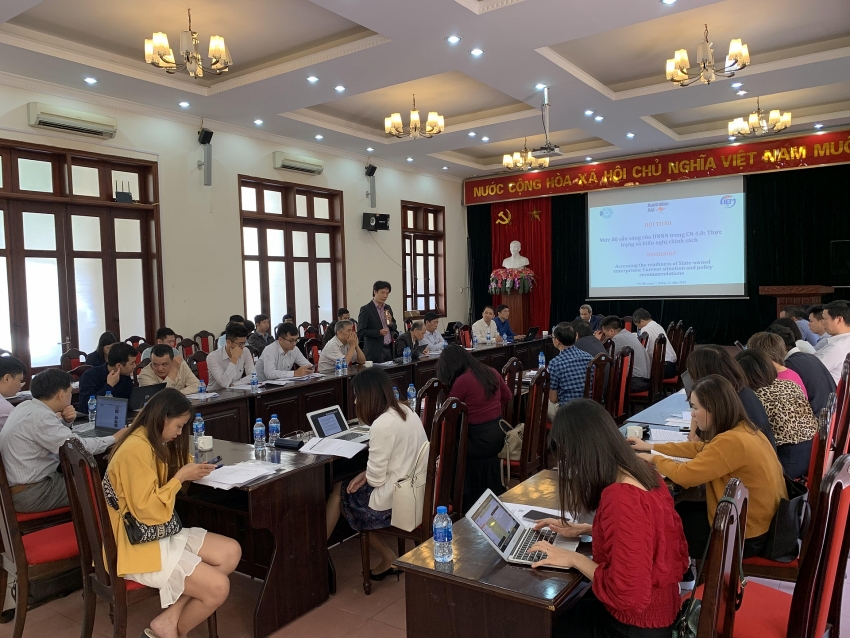Industry 4.0 to triple performance of SOEs
 |
| Industry 4.0 to triple SOEs performance |
At the Workshop on “Assessing the readiness of state-owned enterprises: Current situation and policy recommendations” held by the Ministry of Planning and Investment’s Central Institute for Economic Management (CIEM) with the support of Australian Aid, the representative of CIEM confirmed that Industry 4.0 is bringing remarkable improvement to SOEs in every aspect.
According to global management consulting firm Boston Consulting Group (BCG), an additional 1.2-3.2 million jobs would be created in Vietnam by 2030 if businesses are aided by 4.0 technology, as well as adding $30-65 billion to Vietnam’s GDP.
If they apply 4.0 technology, SOEs will be able to increase revenue, lead the market, and innovate their business model. A report of PwC several years ago said that 10 per cent of Industry 4.0 pioneers will achieve more than 30 per cent increase in revenue and a 30 per cent cost reduction by 2020.
However, innovation includes numerous risks and costs. Most businesses have to take on losses to try a new business model and chance becoming the winner of the race, or just capture a part of the market. For example, e-commerce platforms in Vietnam like Lazada, Shopee, Tiki, and Sendo are making huge losses (between $10 and $50 million) after several years of operations in Vietnam, a burden SOEs would find difficult to follow.
Thereby, CIEM representative Trinh Duc Chieu pointed out SOEs' disadvantages in approaching Industry 4.0. These include SOEs not being positioned as key parts of the innovation ecosystem, and they are reserved in spending on scientific-technology applications.
According to Phan Duc Hieu, deputy director general of CIEM, the readiness of SOEs is weaker than the private sector. Specifically, the capacity of large-scale SOEs for digital transformation is better than that of small-scale counterparts, while SOEs with less state ownership usually apply 4.0 technology to a larger extent than the ones with more state capital.
The reasons come from shortcomings in policies and procedures, including plans and strategies for SOEs approaching new science and technology, the lack of solutions for restructuring SOEs towards Industry 4.0.
Sharing about the challenges facing business, Le Hai Dang from Vietnam Electricity (EVN) emphasised that it is difficult to recruit and retain talents at SOEs. EVN has been developing a subsidiary specialising in IT with no special incentives compared to others, so it is not only difficult to recruit talents but also easy to be a victim brain drain because remuneration at private firms is much better. Additionally, applying blockchain and AI needs to be researched for the particular sector of EVN.
Sharing his views, a representative of Petrovietnam said that SOEs do not fully utilise their employees' abilities. Moreover, it is difficult to implement policies like setting aside 3-10 per cent of the SOEs' revenue for science and technology funds. And the leaders of SOEs, who have the authority to decide to pour large capital into hi-tech projects will have to take responsibilities if the projects do not turn a profit.
Therefore, experts at the workshop said that the state should create stronger momentum, even introducing a measure of competition in their operations to actually apply 4.0 technology, while SOEs should proactively restructure and reform their operations towards the market economy, reducing dependence on the state.
What the stars mean:
★ Poor ★ ★ Promising ★★★ Good ★★★★ Very good ★★★★★ Exceptional
Related Contents
Latest News
More News
- Foreign leaders extend congratulations to Party General Secretary To Lam (January 25, 2026 | 10:01)
- 14th National Party Congress wraps up with success (January 25, 2026 | 09:49)
- Congratulations from VFF Central Committee's int’l partners to 14th National Party Congress (January 25, 2026 | 09:46)
- 14th Party Central Committee unanimously elects To Lam as General Secretary (January 23, 2026 | 16:22)
- Worldwide congratulations underscore confidence in Vietnam’s 14th Party Congress (January 23, 2026 | 09:02)
- Political parties, organisations, int’l friends send congratulations to 14th National Party Congress (January 22, 2026 | 09:33)
- Press release on second working day of 14th National Party Congress (January 22, 2026 | 09:19)
- 14th National Party Congress: Japanese media highlight Vietnam’s growth targets (January 21, 2026 | 09:46)
- 14th National Party Congress: Driving force for Vietnam to continue renewal, innovation, breakthroughs (January 21, 2026 | 09:42)
- Vietnam remains spiritual support for progressive forces: Colombian party leader (January 21, 2026 | 08:00)

 Tag:
Tag:


























 Mobile Version
Mobile Version